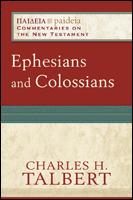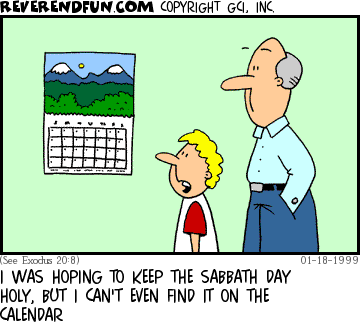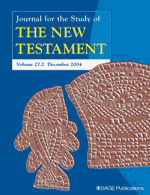With the upcoming
ETS and
SBL annual meetings just round the corner, academic publishers are rushing to announce new releases of numerous academic books to capture the attention of the delegates of the two largest biblical conferences.

One highlight is the inauguration of the a brand new commentary series:
Paideia: Commentaries on the New Testament, published by
Baker Academic.
The first volume in this series,
Ephesians and Colossians by
Charles H. Talbert, will soon be released in time for the conferences.
With the proliferation of commentaries, is there a justification for another new series? What then is the distinction of the
Paideia series?
According to the editors of the series, Mikeal C. Parsons and Charles H. Talbert,
Paideia aims itself to be "a series that sets out to comment on the
final form of the New Testament text in a way that pays due attention both to the cultural, literary, and theological settings in which the text took form and also to the interests of the contemporary readers to whom the commentaries are addressed." (emphasis mine)
Who then is this series targeted at?
"This series is aimed
squarely at students—including MA students in religious and theological studies programs, seminarians, and upper-divisional undergraduates—who have theological interests in the biblical text." (emphasis mine)
"Thus, the didactic aim of the series is to enable students to understand each book of the New Testament as a literary whole rooted in a particular ancient setting and related to its context within the New Testament."
How then would
Paideia aim to achieve this? How would the commentaries in this series look like? What is the approach used?
According to the editors, "each commentary deals with the text in terms of
larger rhetorical units; these are
not verse-by-verse commentaries. This series thus stands within the stream of recent commentaries that attend to the
final form of the text. Such
reader-centered literary approaches are inherently
more accessible to liberal arts students without extensive linguistic and historical-critical preparation than older exegetical approaches, but within the reader-centered world the sanest practitioners have
paid careful attention to the extratext of the original readers, including not only these readers’ knowledge of the geography, history, and other context elements reflected in the text but also to their ability to respond correctly to the literary and rhetorical conventions used in the text.
Paideia commentaries pay
deliberate attention to this extratextual repertoire in order to highlight the ways in which the text is designed to persuade and move its readers." (emphasis mine)
"Each rhetorical unit is explored from three angles:
(1) introductory matters;
(2) tracing the train of thought or narrative flow of the argument; and
(3) theological issues raised by the text that are of interest to the contemporary Christian.
"Thus, the primary
focus remains on the text and not its historical context or its interpretation in the secondary literature." (emphasis mine)
It is worthwhile to note that contributors to this series comprise scholars of international reputation. Apart from the first installment by Charles H. Talbert on
Ephesians and Colossians, forthcoming volumes in the
Paideia series include: James W. Thompson on
Hebrews (Fall 2008), Mikeal C. Parsons on
Acts (Fall 2008), Frank J. Matera on
Romans, Pheme Perkins on
First Corinthians, and Raymond F. Collins on
Second Corinthians.Thus far, this series appears to be interesting enough to capture my attention. I would be very interested to see as to how the above aims and objectives will be achieved in the first installment of this series,
Ephesians and Colossians, that will be released soon. If successful, this series will be helpful not only for theological students but also for anyone who is interested in the final form and theological interests in the New Testament. It may also prove to be useful for lay teachers and preachers in the church. While this series is aimed at students, it is hope that seasoned scholars will also find this series engaging enough to be able to satisfy one's hunger for scholarly investigation of the biblical texts. Having said that, judging solely from the description of the series, it seems that those who are primarily interested in the historical-critical approaches to the biblical texts may have to look elsewhere.
I look forward to be a proud owner of the first volume in the
Paideia series.
 The revised TEE schedule for 2008 is finally posted on the web.
The revised TEE schedule for 2008 is finally posted on the web. 

























